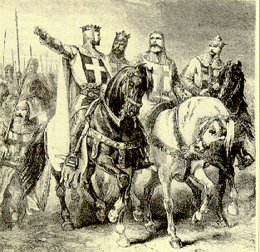Richard Carew (antiquary)
Appearance

Who great sepulchre of our Lord did free.
Richard Carew (17 July 1555 – 6 November 1620) was a Cornish translator and antiquary.
| This article on an author is a stub. You can help out with Wikiquote by expanding it! |
Quotes
[edit]- I sing the goodly armes, and that Chieftaine
Who great Sepulchre of our Lord did free.
Much with his hande, much wrought he with his braine;
Much in that glorious conquest suffred hee:
And hell in vaine hitselfe opposde, in vaine
The mixed troopes Asian and Libick flee
To armes, for Heaven him favour'd, and he drew
To sacred ensignes his straid mates anew.- Godfrey of Bulloigne, or the Recoverie of Hierusalem. An Heroicall poeme written in Italian by Seig. Torquato Tasso, and translated into English by R. C. [Richard Carew] Esquire: and now the first part containing five cantos imprinted in both languages, &c. (1594), opening stanza
- Compare Edward Fairfax's translation (1600): "The sacred armies, and the godly knight, / That the great sepulchre of Christ did free, / I sing;" altered by Atterbury thus: "I sing the war made in the Holy Land, / And the great Chief that Christ's great tomb did free."
- Now was it night, when in deepe rest enrol'd
Are waves and windes, and mute the world doth show
Weari'd the beasts, and those that bottome hold
Of billow'd sea, and of moyst streames that flow,
And who are lodged in cave, or pen'd in fold,
And painted flyers in oblivion low,
Under their secret horrours silenced,
Stilled their cares, and their harts suppelled.- Godfrey of Bulloigne, or the Recoverie of Hierusalem (1594), Canto II, stanza 96
External links
[edit] Encyclopedic article on Richard Carew (antiquary) on Wikipedia
Encyclopedic article on Richard Carew (antiquary) on Wikipedia

